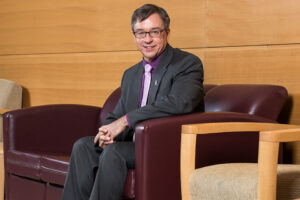President’s Fellows: Improve Health With Health Literacy
Published 5/11/21 on UMB News
On April 6, the University of Maryland, Baltimore’s (UMB) President’s Fellows gathered together virtually to present their findings from the 2020-2021 President’s Symposium and White Paper Project.
The title of this year’s white paper was “Health Literacy as a Social Determinant of Health.” It centered on expanding the University’s role in improving the relationship between provider and patient, which would allow patients to be well-informed and active decision-makers in their health and the health of their families.

“These papers have served to provide myself and the senior leadership at UMB with new ideas that have impacted both inside as well as outside of the University,” said UMB President Bruce E. Jarrell, MD, FACS, during his opening remarks. “Our students know more of what’s going on here and going on in our community, and I’m pleased to say that this is yet another attempt for us in the senior administration to listen to our students, to pay attention to what they’re saying, and hopefully take action on this.”
Traditionally, the President’s Symposium and White Paper Project engages students from the schools of dentistry, law, medicine, nursing, pharmacy, and social work from UMB. This year, the group of fellows also included a student from the School of Public Health at the University of Maryland, College Park (UMCP) who participated in the yearlong research project and conversation on health literacy.
“I’m especially pleased to be in collaboration with UMB through the MPower, MPowering the State initiative,” said UMCP President Darryll Pines, PhD. “This collaboration is very important for the advancement of research on both our campuses, and now we are going to learn from our students and hopefully take some lessons for both of our institutions, but more importantly, our community.”
During their presentation, the fellows first provided background information on health literacy as a national issue. They explained that about 36 percent of U.S. adults have below-basic health literacy levels, which is the cause of between 7 and 17 percent of all national health expenditures. The fellows used several methods to research the most effective ways to implement change to improve health literacy including literature review, faculty interviews and questionnaires, student surveys, assessments of current practices in curricula and learning environments, and development of recommendations.
From this research the fellows had several main takeaways. Although health literacy representation could be found in dentistry, medicine, nursing, pharmacy, public health, and social work, health literacy interventions were not common nor standardized across the professional fields.
“In many cases, we found the education in health literacy was standalone and didn’t involve interaction across professions,” explained Sonia Galvan, a first-year student in the University of Maryland School of Nursing. “This is a missed opportunity for expanding health literacy education and demonstrating its place in professional collaborative relationships through interprofessional practice.”
The recommendations that the fellows drafted centered around four major themes to maximize public health and quality of life: education, research, community engagement, and interprofessional collaboration. From the list of specific recommendations, the fellows pulled a list of their top 10 priority actions based on a collective assessment of importance, urgency, and accountability.
Top 10 Priority Actions:
- Professional development for UMB and UMCP faculty.
- Satellite campus for UMCP’s Horowitz Center for Health Literacy on the UMB campus.
- Hire a director of the Horowitz Center initiative to lead the satellite campus and promote collaboration between UMB and UMCP campuses.
- Incorporate best practices in the COVID-19 vaccination campaign.
- Advocate for accreditation changes.
- Develop early and systemic integration of health literacy principles.
- Expand opportunities and funding to develop, implement, and evaluate evidence-based interventions to improve health literacy.
- Establish research opportunities and funding to develop, implement, and evaluate evidence-based interventions to improve health literacy.
- Develop a UMB student orientation inclusive of health literacy as a social determinant of health.
- Promote an interdisciplinary approach to health literacy education.
(Read the full 2020-2021 President’s White Paper Project here.)
“These students have done us a great service,” said Jay A. Perman, MD, University System of Maryland chancellor and former UMB president. “I’m excited about two things. First of all, these students have lifted up the importance of health literacy and the importance of social determinants of health. And the other piece that provides me with extraordinary gratification is your constant focus on what UMB and UMCP can do together. That was the vision of MPower and here you are so beautifully illustrating what two great institutions can do when we come together in a partnership.”
Participating Fellows:
Alice Lu, Fourth-Year Student, University of Maryland School of Pharmacy
Dominique Gelmann, Third-Year Student, University of Maryland School of Medicine
Elisabeth Fassas, Second-Year Student, University of Maryland School of Medicine
Henry Inegbenosun, Fourth-Year Student, University of Maryland School of Nursing
Jocelyn Wang, Second-Year Student, University of Maryland School of Law
Karen Jung, Second-Year Student, University of Maryland School of Dentistry
Kelsie Challenger, Student, University of Maryland, College Park
Sakiera Malone, Second-Year Student, University of Maryland School of Social Work
Sonia Galvan, First-Year Student, University of Maryland School of Nursing



